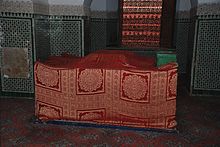Qāḍī ʿIyāḍ قاضي عياض | |
|---|---|
| Title | Shaykh al-Islām Al-Ḥāfiẓ Qāḍī |
| Personal | |
| Born | 1083 |
| Died | 1149 |
| Religion | Islam |
| Era | Islamic Golden Age |
| Denomination | Sunni |
| Jurisprudence | Maliki |
| Creed | Ash'ari[1][2][3] |
| Main interest(s) | Islamic theology (Kalam), Fiqh, Hadith, History, Legal theory, Tafsir, Arabic language, Genealogy, Poetry |
| Notable work(s) | Ash-Shifa |
| Occupation | Scholar, Muhaddith, Qadi, Jurist, Legal theorist, Mufassir, Grammarian, Linguist, Historian, Genealogist, Poet |
| Muslim leader | |

Abū al-Faḍl ʿIyāḍ ibn Mūsā ibn ʿIyāḍ ibn ʿAmr ibn Mūsā ibn ʿIyāḍ ibn Muḥammad ibn ʿAbd Allāh ibn Mūsā ibn ʿIyāḍ al-Yaḥṣubī al-Sabtī (Arabic: أبو الفضل عياض بن موسى بن عياض بن عمرو بن موسى بن عياض بن محمد بن عبد الله بن موسى بن عياض اليحصبي السبتي[5]), better known as Qāḍī Iyāḍ (Arabic: قاضي عياض) (1083–1149), was a Sunni polymath[6] and considered the leading scholar in Maliki fiqh and hadith in his time.[7][8] In addition, he specialized in theology, legal theory, scriptural exegesis, Arabic language, history, genealogy, and poetry.[1][9]
- ^ a b Yassin Ghanem Jassim al-Aridi (2024). Classes of Ash'aris, notables of the people of the Sunnah and the community. Dar al-Kotob al-'Ilmiyya. p. 180-181. ISBN 9786144962350.
- ^ Gibril Fouad Haddad (2 May 2015). The Biographies of the Elite Lives of the Scholars, Imams & Hadith Masters. As-Sunnah Foundation of America. p. 164.
Imam al-Subki mentions him among those who followed the school of Imam Ashari in Beliefs & Doctrine (Aqidah) along with Abu al-Walid al-Baji, Abu al-Hasan al-Qabisi, Abu al-Qasim bin Asakir, Abu al-Hasan al-Muradi, Abu Sad bin al-Samani, Abu Tahir al-Silafi, Qadi Iyad and Al-Shahrastani
- ^ Knysh, Alexander D. (1999). Ibn ʻArabi in the Later Islamic Tradition The Making of a Polemical Image in Medieval Islam. State University of New York Press. p. 236. ISBN 9780791439678.
- ^ Mohammed Sijelmassi, André Miquel, Royal Illuminated manuscripts of Morocco, p.62,
- ^ Camilo Gómez-Rivas, Islamic Legal Thought: A Compendium of Muslim Jurists, p 324. Koninklijke Brill NV ISBN 978-90-04-25452-7
- ^ Brockopp, Jonathan E. (10 August 2017). Muhammad's Heirs The Rise of Muslim Scholarly Communities, 622-950. Cambridge University Press. p. 1. ISBN 9781107106666.
- ^ Catlos, Brian A. (2018). Kingdoms of Faith A New History of Islamic Spain. C. Hurst & Co. p. 259. ISBN 9781787380035.
- ^ Mohammad Ilyas, Syed Kamarulzaman Kabeer (3 June 2008). Unified World Islamic Calendar Sharia' Science and Globalization. Arabic Virtual Translation Center. p. 66.
- ^ Bagley, F.R.C. (February 2013). Twenty-three Years A Study of the Prophetic Career of Mohammad. Taylor & Francis. p. 66. ISBN 9781135030414.